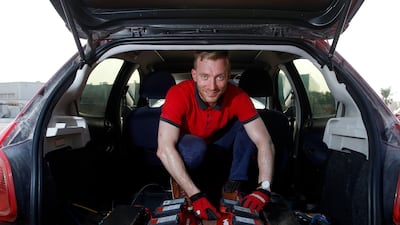From a distance, save for a three-tone paint job, the Peugeot 206 in front of me looks like a standard small car of 10-year-old vintage in the UAE. It's a bit sun-worn and rough around the edges, missing its trademark lion-logo bonnet badge, but otherwise there's nothing obviously out of the ordinary.
Move a bit closer, however, and there are some signs that all isn't quite as it seems. The front of the car is slightly lifted; the rear tyres are protruding from their wheel arches. Peep under the bonnet, meanwhile, and where an engine normally sits, there's a gaping hole, exposing the road beneath the car. Open the boot, and things get really interesting.
This isn’t just any project car: this little Pug has been modified into an electric vehicle that runs on power-tool batteries – eight of them to be precise, in the car’s boot. They are mounted in two banks of four and power motors directly connected to the back wheels. Its maker claims that it’s the first of its kind in the world.
"There are eight batteries there, so four are used for each motor," explains Konstantin Fedin, 29, the Russian employee of construction-industry company Hilti, who is behind the project. "A controller for the motor works on 90 to 100 volts, then each battery gives 22-point-something volts. So when you sum them, four [together], you have 88 to 90 volts [per wheel], which is enough to drive it."
Fedin originally devised the project about a year ago when he was a product manager for power tools at Hilti (he has since moved into a sales role with the company). The initial idea was to showcase the stamina of Hilti's power-tool batteries, in an attempt to drive its cordless power-tool sales, but it bloomed into a labour of love that swallowed Fedin's weekends for nine months. He bought the 206 for "a couple of thousand dirhams" on Dubizzle, after his first target, an Audi TT, proved too heavy. He then set about reducing the Peugeot's weight, including removing the engine, and converting its boot into a battery bay.
__________________________
READ MORE:
Tesla's mammoth cash burn does not faze investors
Life in the fast lane - the future of transport in the UAE
Middle East's first Tesla showroom launches in Dubai
Meet the determined owners who brought their Teslas to the UAE
__________________________
I'm with Fedin at Hilti's base in Dubai Investments Park to see the car in action. It is, by its creator's own admission, no Tesla, certainly in terms of refinement. The batteries purely power the back wheels, which means, among other things, that the windows don't wind down and the closest thing to air conditioning is throwing open the door mid-drive. But given the scale of the power source in the boot, and the fact that one man built it all, it's a mighty impressive demonstration.
"I asked different people in the automobile industry and electro-mechanical industry: 'How can I do this?'" Fedin recalls of dealing with technological knock-backs in the project's early days. "And then every time I used to say: "So it's not really possible – forget about it." Then after some brainstorming after weeks and weeks, we found a solution. So it was challenging. Every time, we were facing issues that we had never faced before," he says.

The car's speed is limited by a cut-off point that Fedin installed to stop the motors taking too much power at once from the batteries, and while he's yet to test the 206's full range, he estimates that it will drive for "kilometres, at least". After five laps of the company's car park, the batteries hadn't discharged at all.
After his success with this unusual electric car, Fedin already has ideas for a subsequent battery-powered project. "I thought of a helicopter," he says. "Maybe I come down from the roof of this building.
"I have a very big passion for several things: cars and battery- and cordless-operated things. Now I'm bringing this passion into real-life projects. I think it's cool to develop an electric car out of construction batteries – the first ever in the world."

